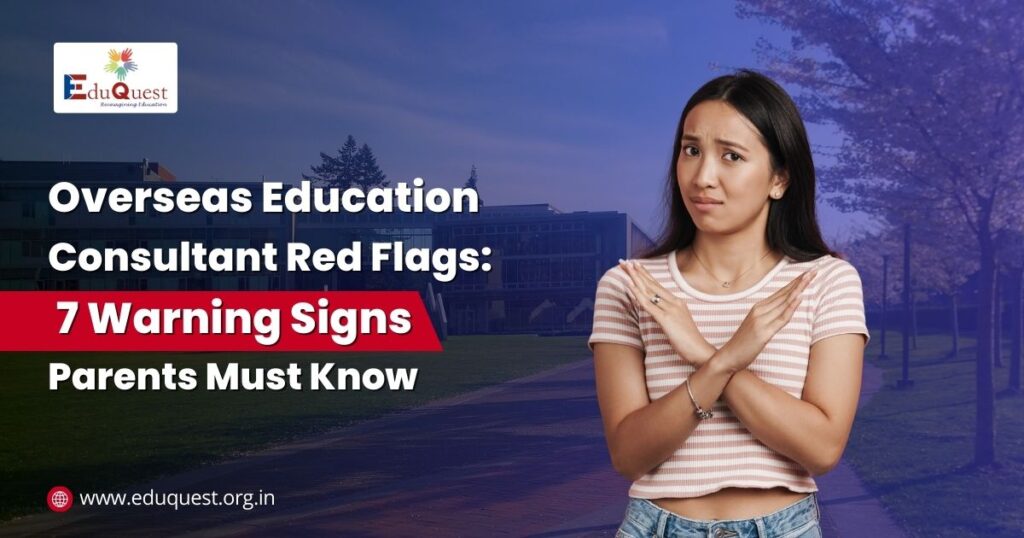The phone call came at 11 PM. Priya’s mother was sobbing uncontrollably. After paying ₹4.5 lakhs to a supposedly reputable overseas education consultant in Delhi, they discovered their “guaranteed” university admissions were fake, the consultant had disappeared, and Priya had missed all real application deadlines. Her dream of studying computer science abroad was shattered, along with her family’s life savings.
This nightmare scenario plays out hundreds of times each year across India. Families trust international education consultants with their children’s futures and their hard-earned money, only to discover too late that they’ve fallen victim to sophisticated scams or grossly incompetent service providers.
As someone who has investigated over 200 cases of consultant fraud and malpractice, I’ve identified seven critical red flags that every parent must recognize. These warning signs can save your family from financial ruin and protect your child’s educational future. More importantly, knowing what to avoid will help you identify genuinely competent study abroad consultants who can actually deliver on their promises.
The overseas education industry in India is worth over ₹15,000 crores annually, attracting both legitimate professionals and opportunistic fraudsters. The difference between the two can determine whether your child gets into their dream university or faces devastating disappointment.
Red Flag #1: Guaranteed Admissions to Specific Universities
The most dangerous red flag is any study abroad consultant who promises guaranteed admission to specific prestigious universities, especially Ivy League schools or other highly competitive institutions.
Why This Promise Is Impossible
University Independence: No external consultant has the power to guarantee admissions to universities like Harvard, MIT, Oxford, or Cambridge. These institutions make independent decisions based on their own criteria and competitive applicant pools.
Admission Statistics Reality: Top universities reject 90-95% of applicants, including many with perfect test scores and exceptional profiles. No consultant can override these statistical realities.
Legal and Ethical Violations: Universities would immediately terminate relationships with any consultant making such guarantees, as it violates their admission integrity policies.
How Fraudulent Consultants Make These Claims
Fake University Partnerships: Some consultants claim exclusive partnerships with prestigious universities that don’t actually exist. They may show fabricated documents or certificates to support these claims.
Bait and Switch Tactics: After taking your money, these consultants later claim that “circumstances changed” or that your child’s profile wasn’t quite strong enough for the guaranteed university, but they can get admission somewhere else.
Conditional Guarantees: They bury impossible conditions in fine print, such as requiring perfect test scores or specific achievements that make the guarantee meaningless.
Real Case Study: The Sharma Family Disaster
The Sharma family from Gurgaon paid ₹6 lakhs to a consultant who guaranteed their son admission to MIT. The consultant showed them a fake “partnership certificate” and testimonials from supposed MIT students. After six months of fake progress reports, they discovered:
- No applications were ever submitted to MIT
- The consultant had no relationship with any US universities
- Their money was gone, and application deadlines had passed
- Their son lost an entire year and had to start over with a legitimate consultant
What Legitimate Consultants Actually Say
Professional education consultancy services make realistic statements like:
- “We’ll maximize your chances based on your profile”
- “Our students have been accepted to these universities, but admission depends on many factors”
- “We’ll help you build the strongest possible application”
- “Success rates vary based on individual profiles and competition”
Action Step: Immediately eliminate any consultant who guarantees admission to specific competitive universities. This single red flag should end your consideration regardless of other factors.
Red Flag #2: Pressure Tactics and Artificial Urgency
Legitimate international student advisors understand that choosing educational services is a major family decision requiring careful consideration. Fraudulent or desperate consultants use high-pressure tactics to force quick decisions.
Common Pressure Tactics to Recognize
Limited Time Offers: “This special price expires tomorrow” or “We only have two spots left in our program” are classic manipulation techniques designed to prevent you from researching alternatives.
Fabricated Deadlines: Creating fake urgency about university application deadlines when you actually have months to prepare properly.
Emotional Manipulation: Using fear tactics like “Your child will never get into a good university without our help” or “Other students are already ahead of you.”
Immediate Payment Demands: Requiring full payment or large deposits before providing detailed service information or contracts.
The Psychology Behind Pressure Tactics
Scarcity Principle: Fraudulent consultants create artificial scarcity to trigger impulsive decision-making.
Fear of Missing Out (FOMO): They exploit parents’ anxiety about their children’s futures to bypass rational evaluation.
Decision Fatigue: By overwhelming families with information and pressure, they make it easier to simply say yes rather than continue researching.
Real Example: The Kumar Family’s Near Miss
Mr. Kumar received a call from a study abroad advisor claiming his daughter needed to enroll immediately or miss the “early bird” deadline for US applications. The consultant demanded ₹3 lakhs within 24 hours and refused to provide written service details. Fortunately, Mr. Kumar researched and discovered:
- US university applications weren’t due for six months
- The consultant had no verifiable track record
- The “early bird” deadline was completely fabricated
- Taking time to research saved them from a ₹3 lakh scam
How Professional Consultants Behave
Reputable overseas education consultants demonstrate professionalism through:
- Encouraging you to take time for decision-making
- Providing detailed written information without pressure
- Offering trial sessions or consultations before commitment
- Explaining realistic timelines without artificial urgency
- Welcoming questions and comparison shopping
Red Flag Test: If a consultant pressures you to decide immediately or makes you feel uncomfortable about taking time to research, walk away immediately.
Red Flag #3: Vague or Evasive Answers About Services and Processes
Professional study abroad consultants should be able to explain their services, processes, and methodologies clearly and in detail. Vague or evasive responses indicate either incompetence or intentional deception.
Warning Signs of Evasive Communication
Generic Responses: When you ask specific questions about their process, they provide generic answers that could apply to any consultant or situation.
Avoiding Specifics: They refuse to explain exactly what services are included in their packages or how they approach different aspects of the application process.
Changing Stories: Different staff members provide contradictory information about services, timelines, or outcomes.
Reluctance to Provide References: They make excuses for why they can’t provide contact information for recent successful clients.
Critical Questions That Expose Incompetent Consultants
Ask these specific questions and watch for evasive responses:
About Their Process:
- “Can you walk me through your exact process for university selection?”
- “How do you determine which universities are realistic targets for my child’s profile?”
- “What specific steps do you take to help students improve their profiles?”
About Their Track Record:
- “Can you provide contact information for three families you’ve helped in the past six months?”
- “What was your actual acceptance rate last year for students with similar profiles?”
- “Can you show me specific examples of successful applications you’ve managed?”
About Their Expertise:
- “What are the current admission trends at universities my child is interested in?”
- “How have recent changes in visa policies affected your students?”
- “What makes your approach different from other consultants?”
The Information Asymmetry Problem
Knowledge Gaps: Incompetent consultants often lack current information about university requirements, admission trends, or visa processes.
Outdated Information: They may rely on information that’s several years old, which can be catastrophic in the rapidly changing international education landscape.
Lack of Specialization: They claim expertise in all countries and programs but actually have deep knowledge in none.
Real Case Study: The Patel Family’s Discovery
The Patel family spent three consultations with a supposedly experienced international education consultant who couldn’t answer basic questions about their daughter’s target programs. Red flags included:
- Vague responses about admission requirements for engineering programs
- Inability to explain recent changes in Canadian immigration policies
- Contradictory information from different staff members
- Refusal to provide specific examples of successful engineering applications
When they consulted a legitimate professional, they received detailed, specific answers to all their questions within the first meeting.
How to Evaluate Consultant Knowledge
Test Their Expertise: Ask detailed questions about your child’s specific interests and target countries.
Request Documentation: Ask for written explanations of their processes and methodologies.
Verify Information: Cross-check their answers with official university and government websites.
Compare Consultants: Ask the same questions to multiple consultants and compare the quality and specificity of responses.
Red Flag #4: No Physical Office or Unprofessional Operations
The location and professionalism of a consultant’s operations provide crucial insights into their legitimacy and stability. Many fraudulent study abroad services operate from residential addresses or have unprofessional setups that should raise immediate concerns.
Office and Operations Red Flags
Residential Addresses Only: Consultants operating from home addresses without proper business establishments often lack the infrastructure and commitment for professional service delivery.
Virtual Offices Without Physical Presence: Some fraudsters rent virtual office addresses or use co-working spaces without maintaining actual operations there.
Unprofessional Staff and Environment: Lack of trained staff, unprofessional behavior, or chaotic office environments indicate poor business management.
No Proper Business Registration: Legitimate consultants should have proper business licenses, GST registration, and legal documentation.
Why Physical Infrastructure Matters
Accountability: Physical offices make consultants more accountable and harder to disappear with your money.
Stability: Established offices indicate business stability and long-term commitment to the market.
Professional Systems: Proper offices usually have better systems for document management, communication, and service delivery.
Legal Recourse: Physical addresses provide legal recourse options if disputes arise.
How to Verify Consultant Operations
Visit in Person: Always visit the consultant’s office before making any commitments or payments.
Check Business Registration: Verify GST numbers, business licenses, and legal registration status.
Observe Operations: Look for professional staff, organized systems, and proper infrastructure.
Verify Address Claims: Ensure the consultant actually operates from their claimed address, not just uses it for mail.
Technology vs Physical Presence Balance
Legitimate Online Consultants: Some genuine consultants operate primarily online but should still have:
- Verifiable business registration and legal status
- Professional websites with detailed information
- Clear communication channels and response systems
- Transparent pricing and service documentation
Red Flags for Online-Only Services:
- No verifiable business address or registration
- Poor website quality or lack of detailed information
- Unprofessional communication or delayed responses
- Reluctance to provide business verification documents
Red Flag #5: Unrealistic Fee Structures or Hidden Costs
Money-related red flags are among the most important warning signs of problematic education migration consultants. Both extremely low fees and hidden cost structures can indicate serious problems.
Pricing Red Flags to Watch For
Suspiciously Low Fees: Comprehensive study abroad services require significant expertise and time. Fees far below market rates often indicate:
- Inexperienced consultants trying to attract clients
- Hidden costs that will be revealed later
- Poor quality services that don’t deliver results
- Potential fraud where consultants take money and disappear
Unclear Pricing Structure: Legitimate consultants provide detailed breakdowns of what’s included in their fees. Red flags include:
- Vague descriptions of included services
- Reluctance to provide written fee structures
- Constantly changing prices or additional charges
- No clear payment terms or refund policies
Excessive Upfront Payments: While some advance payment is normal, requiring full payment before service delivery is risky.
Hidden Cost Strategies
Bait and Switch Pricing: Initial quotes that seem reasonable but escalate dramatically once you’re committed:
- “Basic” packages that don’t include essential services
- Additional charges for services you assumed were included
- Premium charges for “urgent” processing or “priority” treatment
- Separate fees for each university application or service component
Commission-Based Conflicts: Some consultants earn more from university commissions than client fees, creating potential conflicts of interest in university recommendations.
Real Case Study: The Gupta Family’s Fee Nightmare
The Gupta family was quoted ₹2.5 lakhs for “complete study abroad services.” Over six months, additional charges accumulated:
- ₹50,000 for “premium” essay editing
- ₹75,000 for “expedited” application processing
- ₹40,000 for scholarship application assistance
- ₹30,000 for visa interview preparation
- ₹25,000 for “document verification” services
Their total cost reached ₹5.2 lakhs – more than double the original quote.
How to Evaluate Pricing Fairly
Market Research: Research typical pricing from multiple consultants to understand reasonable fee ranges.
Detailed Breakdown: Insist on written documentation of exactly what’s included in quoted fees.
Payment Schedule: Negotiate payment schedules tied to service delivery milestones rather than upfront payments.
Refund Terms: Understand refund policies and ensure they’re fair and clearly documented.
Questions to Ask About Fees
- “What exactly is included in this fee?”
- “Are there any additional charges I should expect?”
- “Can you provide a written breakdown of all potential costs?”
- “What are your refund terms if I’m not satisfied with services?”
- “Do you receive commissions from universities you recommend?”
Red Flag #6: Lack of Proper Credentials and Verifiable Experience
The study abroad consultancy industry lacks standardized certification requirements, making it crucial for families to verify consultant credentials and experience independently.
Credential Red Flags
No Relevant Educational Background: Consultants without relevant education or international experience may lack the knowledge needed for effective guidance.
Unverifiable Claims: Consultants who claim impressive credentials but can’t provide documentation or verification.
Fake Certifications: Some consultants display fake certificates or claim memberships in non-existent professional organizations.
Exaggerated Experience: Claims of extensive experience that don’t match the consultant’s apparent age or career timeline.
Essential Credentials to Verify
Educational Background:
- Relevant degrees, preferably including international education
- Professional certifications from recognized organizations
- Continuing education and training records
Professional Experience:
- Specific experience in study abroad consulting
- Track record with students similar to your child’s profile
- Verifiable employment history and references
Professional Associations:
- Membership in legitimate organizations like ICEF, AIRC, or NAFSA
- Participation in professional development activities
- Industry recognition or awards
How to Verify Consultant Credentials
Request Documentation: Ask for copies of degrees, certificates, and professional memberships.
Independent Verification: Contact professional organizations directly to verify claimed memberships.
Reference Checks: Speak with previous employers or professional references.
Online Research: Search for the consultant’s professional background and any public recognition.
Warning Signs of Credential Problems
Reluctance to Share Information: Legitimate professionals are proud of their credentials and happy to share them.
Vague Descriptions: Generic descriptions of experience without specific details or verifiable information.
Impressive-Sounding but Meaningless Titles: Titles like “Certified International Education Expert” that aren’t from recognized organizations.
Inconsistent Information: Different sources providing contradictory information about the consultant’s background.
Red Flag #7: Poor Communication and Unprofessional Behavior
Communication quality during the initial consultation process is often the best predictor of service quality throughout your relationship with a college admission consultant.
Communication Red Flags
Delayed or Inconsistent Responses: Professional consultants understand that families have questions and concerns requiring timely responses.
Poor Language Skills: Consultants helping with international applications should demonstrate excellent communication skills themselves.
Unprofessional Behavior: Inappropriate language, disrespectful treatment, or unprofessional conduct during consultations.
Lack of Organization: Forgetting appointments, losing documents, or appearing disorganized during meetings.
Why Communication Quality Matters
Service Delivery Indicator: Poor communication during sales processes usually worsens during service delivery.
Stress Management: Study abroad processes are stressful; you need consultants who communicate clearly and supportively.
Problem Resolution: When issues arise (and they will), effective communication is essential for resolution.
Trust Building: Professional communication builds the trust necessary for successful consultant-client relationships.
Testing Communication Quality
Response Time Test: Send emails or messages with questions and evaluate response speed and quality.
Clarity Assessment: Ask complex questions and evaluate whether responses are clear and comprehensive.
Professionalism Evaluation: Observe behavior during meetings, phone calls, and written communications.
Organization Check: Notice whether consultants are prepared, punctual, and organized during interactions.
Professional Communication Standards
Timely Responses: Professional consultants typically respond to emails within 24-48 hours and return calls promptly.
Clear Documentation: They provide written summaries of meetings, clear timelines, and detailed service explanations.
Respectful Interaction: They treat both parents and students with respect and maintain professional boundaries.
Proactive Updates: They provide regular progress updates without requiring constant follow-up from families.
How These Red Flags Interconnect
Understanding how these red flags often appear together can help you identify problematic consultants more effectively:
Common Red Flag Combinations
Fraudulent Operations: Typically combine guaranteed admissions promises, pressure tactics, vague service descriptions, and poor communication.
Incompetent Consultants: Often show credential problems, unclear processes, unprofessional operations, and communication issues.
Exploitative Practices: Usually involve hidden fees, pressure tactics, unrealistic promises, and evasive answers about services.
The Cascade Effect
Initial Red Flags Lead to Others: Once you identify one red flag, look carefully for others – they often travel together.
Trust Your Instincts: If something feels wrong during initial interactions, investigate further rather than ignoring your concerns.
Multiple Minor Issues: Several small concerns can add up to major problems – don’t dismiss them individually.
Protecting Your Family: Action Steps
Before Meeting Consultants
Research Preparation:
- Create a list of specific questions about services and processes
- Research typical market pricing for study abroad services
- Prepare criteria for evaluating consultant responses
- Set clear budget limits and stick to them
Background Checks:
- Search online for consultant reviews and complaints
- Check with local education communities and schools
- Verify business registration and legal status
- Look for professional association memberships
During Consultant Meetings
Document Everything:
- Take notes during meetings and ask for written summaries
- Request detailed service breakdowns and pricing information
- Get references for recent successful clients
- Ask for credential documentation
Test Their Knowledge:
- Ask specific questions about your child’s target programs
- Inquire about recent changes in admission requirements
- Request examples of successful applications they’ve managed
- Evaluate the quality and specificity of their responses
After Initial Consultations
Verification Process:
- Contact provided references and verify success stories
- Cross-check information with official sources
- Compare multiple consultants’ advice and approaches
- Verify all credentials and professional claims
Decision Framework:
- Eliminate consultants showing any major red flags
- Compare remaining options based on expertise and fit
- Negotiate terms that protect your interests
- Start with limited engagements before full commitments
The Cost of Ignoring Red Flags
Understanding the real consequences of choosing problematic consultants can motivate proper due diligence:
Financial Costs
Direct Losses: Families typically lose ₹2-8 lakhs in consultant fees when working with fraudulent or incompetent providers.
Opportunity Costs: Poor guidance can result in:
- Missing scholarship opportunities worth ₹5-40 lakhs
- Settling for lower-ranked universities affecting lifetime earnings
- Requiring gap years that delay career starts
- Needing to restart processes with new consultants
Educational Consequences
Missed Opportunities: Poor consultant choices can result in:
- Applications to inappropriate universities
- Missed deadlines for competitive programs
- Inadequate test preparation affecting scores
- Weak applications that don’t showcase student strengths
Long-Term Impact: Educational setbacks can affect:
- Career trajectory and earning potential
- Professional network development
- Personal confidence and motivation
- Family relationships and trust
Emotional Toll
Family Stress: Consultant problems create significant stress for both parents and students during already challenging times.
Student Impact: Poor outcomes can affect student confidence, motivation, and future academic performance.
Relationship Strain: Financial losses and educational disappointments can strain family relationships for years.
Finding Legitimate Consultants: Green Flags to Look For
After understanding what to avoid, here are positive indicators of quality study abroad consultants:
Professional Excellence Indicators
Transparent Operations: Clear pricing, detailed service explanations, and willingness to provide references.
Realistic Expectations: Honest assessments of admission chances and realistic timeline discussions.
Proper Credentials: Verifiable educational backgrounds, professional certifications, and industry experience.
Quality Communication: Prompt, clear, and professional interactions throughout the evaluation process.
Service Quality Markers
Customized Approaches: Personalized strategies based on individual student profiles and goals.
Current Knowledge: Up-to-date information about admission trends, visa requirements, and university preferences.
Comprehensive Support: Well-defined processes covering all aspects of study abroad preparation.
Accountability Measures: Clear metrics for success and systems for tracking progress.
Conclusion: Your Family’s Protection Strategy
The overseas education consultant industry includes both exceptional professionals who genuinely help families achieve their dreams and opportunistic individuals who exploit parental hopes and fears. The difference between the two can determine whether your child gets into their dream university or faces devastating disappointment.
These seven red flags – guaranteed admissions, pressure tactics, vague responses, unprofessional operations, unrealistic fees, poor credentials, and bad communication – are your early warning system. Any consultant displaying these warning signs should be immediately eliminated from consideration, regardless of their marketing claims or apparent success stories.
Your Protection Checklist:
- Never ignore red flags – trust your instincts when something feels wrong
- Verify everything – don’t take consultant claims at face value
- Take time for decisions – resist pressure tactics and research thoroughly
- Document all interactions – keep records of meetings, promises, and agreements
- Start small – begin with limited engagements before full commitments
- Maintain control – keep final decision-making authority throughout the process
- Have backup plans – don’t rely entirely on one consultant for your child’s future
Remember, choosing the right educational consultant is one of the most important decisions your family will make. The stakes are too high to rush this decision or ignore warning signs. Your child’s educational future and your family’s financial security depend on making this choice carefully and wisely.
The most important lesson: A consultant who displays red flags during the sales process will only get worse during service delivery. It’s always better to spend more time finding the right consultant than to spend years recovering from the wrong choice.
Your child deserves better than empty promises and professional incompetence. By recognizing these red flags, you’re taking the first step toward finding genuinely competent guidance that can help turn their international education dreams into reality.
Frequently Asked Questions
What should I do if I've already paid a consultant who shows these red flags?
If you’ve already engaged an overseas education consultant displaying red flags, act quickly to minimize damage. Document all interactions and promises made, review your contract for cancellation terms, and consider stopping payments if services aren’t being delivered as promised. Contact consumer protection agencies if fraud is suspected, and begin researching alternative consultants immediately. Many families successfully switch consultants mid-process, though earlier action typically yields better outcomes.
How can I verify if a consultant's university partnerships are legitimate?
To verify study abroad consultant university partnerships, contact universities directly through their official websites or admissions offices. Ask specifically about their relationship with the consultant and whether they have formal partnership agreements. Legitimate partnerships are usually documented on university websites or through official partnership announcements. Be suspicious of consultants claiming “exclusive” partnerships with prestigious universities, as these rarely exist.
Are there any regulatory bodies that can help if I encounter consultant fraud?
While India lacks comprehensive regulation of international education consultants, several agencies can help with fraud cases. File complaints with local consumer courts, contact the Ministry of External Affairs if passport/visa issues are involved, and report to state consumer protection agencies. Professional associations like ICEF or AIRC have ethical guidelines for members. Additionally, banking authorities can help if financial fraud is suspected, and local police can investigate cases of intentional deception.
What's the difference between aggressive marketing and pressure tactics?
Professional education consultancy services may market actively but respect your decision-making process. Legitimate marketing includes sharing success stories, explaining services clearly, and following up on inquiries. Pressure tactics involve creating false urgency, demanding immediate decisions, threatening that opportunities will disappear, or making you feel guilty for taking time to research. Professional consultants encourage questions and comparison shopping, while problematic ones discourage both.
How long should I take to evaluate and choose a study abroad consultant?
Allow 2-4 weeks for thorough study abroad advisor evaluation, including initial consultations with 3-5 consultants, reference checks, credential verification, and family discussions. Don’t rush this decision due to artificial urgency created by consultants. However, don’t delay unnecessarily if you have genuine application deadlines approaching. The key is balancing thorough evaluation with realistic timeline requirements for your child’s academic goals and university application schedules.













